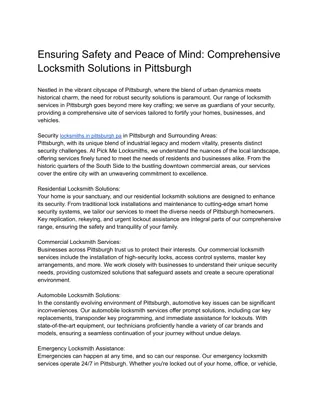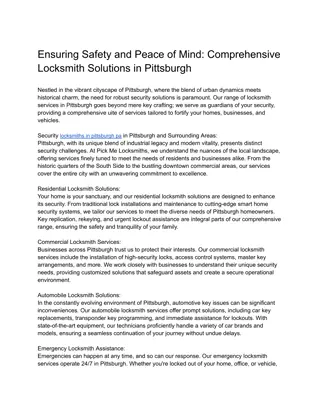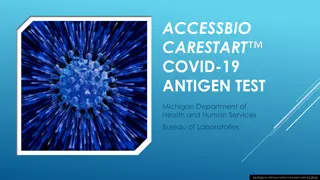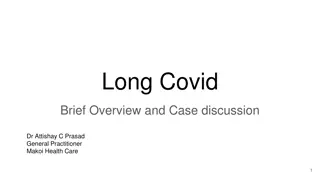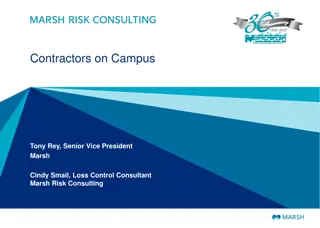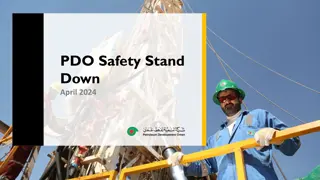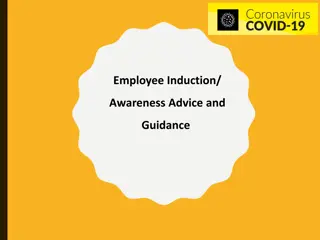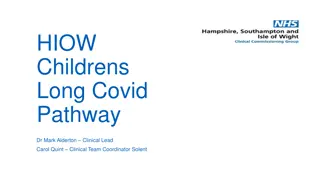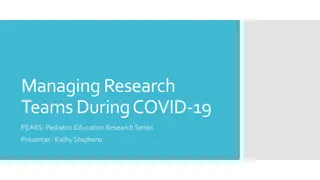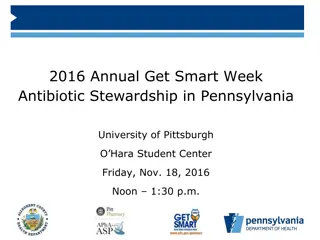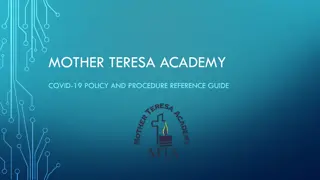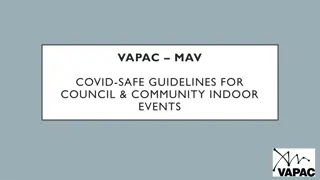University of Pittsburgh COVID-19 Safety Guidelines
Outlining the University of Pittsburgh's guidance for COVID-19 safety, including symptoms, risks, and protective measures. Learn about the primary goals of Pitt's response to the pandemic, symptoms of COVID-19, and groups at elevated risk for severe illness. Stay informed to protect public health and those on campus.
Download Presentation

Please find below an Image/Link to download the presentation.
The content on the website is provided AS IS for your information and personal use only. It may not be sold, licensed, or shared on other websites without obtaining consent from the author. Download presentation by click this link. If you encounter any issues during the download, it is possible that the publisher has removed the file from their server.
E N D
Presentation Transcript
COVID-19 Safety University of Pittsburgh Office of Public Safety and Emergency Management Department of Environmental Health and Safety May 2020
COVID-19 Safety This information outlines the University of Pittsburgh guidance for COVID-19. The primary goals for Pitt s response to the COVID-19 pandemic are to protect public health, and to protect those on our campuses that are working, studying and exploring in support of Pitt s core functions of education, research and community partnership. This information is intentionally broad and is intended to apply to all Pitt affiliates. Individuals should check with their advisors or unit-level management for specific measures that have been developed as part of Pitt s response to the COVID-19 pandemic.
COVID-19 Safety COVID-19 is a respiratory illness caused by a virus (SARS-CoV-2). SARS-CoV-2 is a new (novel) coronavirus. Coronaviruses are an existing group of viruses that generally cause mild to moderate respiratory illness, like the common cold. This virus is a new coronavirus that has spread worldwide, creating a pandemic and a new disease called COVID-19. (picture of the virus?)
COVID-19 Safety The symptoms of COVID-19 include some or all of the following: Cough Shortness of breath or difficulty breathing Fever Chills Muscle pain Sore throat New loss of taste or smell Other less common symptoms have been reported, including gastrointestinal symptoms of nausea, vomiting, and/or diarrhea
COVID-19 Safety The CDC has developed a tool for checking symptoms (insert link) If you have ANY symptoms, no matter if mild or severe, stay home!
COVID-19 Safety Symptoms vary from person to person, and range from no apparent symptoms (asymptomatic) to mild symptoms to severe illness. Deaths have been reported world-wide due to complications of COVID-19. Persons of all age groups have been ill or have died from COVID-19.
COVID-19 Safety It is clear that some groups of people are at elevated risk for severe disease and potentially fatal complications from COVID-19: People of all ages with underlying medical conditions Chronic lung disease Moderate to severe asthma Serious heart conditions Immunocompromised individuals (cancer patients, smoking, organ/bone marrow transplantation, poorly controlled HIV/AIDS, prolonged use of corticosteroids or other immune weakening medications) Severe obesity Diabetes Chronic kidney disease (undergoing dialysis) Liver disease People 65 years and older People who live in nursing homes or long- term care facilities
COVID-19 Safety COVID-19 is primarily spread person to person via respiratory droplets from an infected persons mouth or nose, or from respiratory droplets on an infected person s hands. Respiratory droplets are most commonly produced when a person coughs, sneezes, or speaks Respiratory droplets may land in the mouths or noses of people nearby. Respiratory droplets usually do not travel more than six feet. That is why remaining 6 feet (two arms lengths) away from individuals has become a recommended practice. This is the principle of social distancing keeping six feet away from others as much as possible.
COVID-19 Safety You may also become infected by the virus if you touch an object or surface that was recently contaminated with respiratory droplets containing the virus, and then touch your mouth, nose or eyes. Skin is an effective barrier against this virus. Membranes inside your eyes, nose and mouth are not effective barriers. If you touch your eyes, nose or mouth with your hands (wearing gloves or not wearing gloves) and your hands (wearing gloves or not wearing gloves) have been exposed to the virus, you may become infected. Wash your hands frequently and avoid touching your face. The Centers for Disease Control (CDC) does not recommend wearing gloves for common tasks on campus, at work or in public.
COVID-19 Safety How to protect yourself from COVID-19 Wash your hands with soap and water Prior to touching your face (for any reason) Before preparing or eating food After coughing or sneezing (into a tissue) After touching high-contact surfaces Before and after putting on a face covering (cloth face mask) or other mask
COVID-19 Safety Hand Washing Technique Wash hand frequently with soap and water for at least 20 seconds (sing the chorus to your favorite song) If soap and water are not readily available, use a hand sanitizer that contains at least 60% alcohol As soon as possible, wash hands with soap and water (insert hand washing graphic)
COVID-19 Safety There is increasing evidence that COVID-19 is spread by persons 48 hours before symptoms are apparent. Also there have been asymptomatic individuals (persons not showing any symptoms) confirmed to have COVID-19. These facts contribute to the need for all individuals to practice social distancing (also called physical distancing) by keeping six feet from others that are not part of your household.
COVID-19 Safety Guide to Social Distancing (also referred to as physical distancing) (insert graphic to show social distancing CNN had a few good pics (the width of an average sedan, a standard three seat sofa, etc)
COVID-19 Safety Best methods to protect yourself from COVID-19 Frequent hand washing Do not touch your face, especially your mouth, nose or eyes Practice social distancing (remaining at least 6 feet away from others)
COVID-19 Safety Behaviors you should practice to protect others from COVID-19 Wear a face covering when in public and when on campus Cover your coughs and sneezes with a tissue. Remove face covering before coughing or sneezing. Throw tissue in trash and wash hands. Wash your hands frequently
COVID-19 Safety Behaviors you should practice to protect others from COVID-19 Self-monitor daily for symptoms of COVID-19 Stay home when any COVID-19 symptoms emerge Maintain physical distance of six feet from others in the event that you are infected and symptoms have not emerged or are not apparent. Keep hands clean to avoid contamination of surfaces. Clean and disinfect surfaces in personal spaces after use, especially those surfaces shared with others
COVID-19 Safety Facts about Face Coverings Face coverings are currently expected to be worn in public, on campus, and in campus buildings. Face coverings are worn to prevent asymptomatic individuals from unknowingly spreading the virus. The face covering reduces the amount of respiratory droplets that are expelled when talking, breathing, coughing, sneezing, and laughing. Face coverings must cover the mouth and nose to be effective. Self-supplied cloth face coverings are acceptable and encouraged. If a Pitt-affiliate is on campus and does not have a self-supplied cloth face covering, Pitt will provide that individual a face covering for use on campus.
COVID-19 Safety More Facts about Face Coverings Face coverings provide minimal protection for the wearer; and social distancing must be maintained even with a face covering or other mask. Face coverings are not personal protective equipment and may be re-used if not contaminated. Individuals that cannot wear a mask due to a medical condition may enter campus buildings and are NOT required to provide documentation of a medical condition. Specific research areas may have additional rules about face coverings. If your work requires any type of mask for protection from a hazard, do not substitute a cloth face covering.
COVID-19 Safety Face coverings (insert graphic of individual wearing cloth mask correctly)
COVID-19 Safety Removing your Face Covering Try to avoid touching face, eyes, nose, mouth when removing Wash hands after removing face covering Launder cloth face coverings routinely at home (graphics of removing appropriately)
COVID-19 Safety Face Coverings and other Supplies used for COVID-19 mitigation can be disposed in regular trash. Single use face coverings (also called barrier masks) can be disposed in the regular trash. Gloves, when used for common cleaning, can also be disposed in the regular trash. [Gloves and other protective equipment used by designated and trained personnel to clean areas visited by persons confirmed for COVID-19 will be disposed in a manner that protects others.]
COVID-19 Safety Cleaning and Disinfection of Surfaces Custodians in Facilities Management and Housing are cleaning and disinfecting high touch surfaces and common areas on a more frequent basis for your protection. You are responsible for cleaning/disinfecting high-touch areas in your assigned work area Desktop and drawer handles Phone Keyboard File cabinet handles And possibly shared surfaces in a break/lunch area such as microwave buttons, coffee pot handle, and refrigerator handles
COVID-19 Safety Cleaning and Disinfection of Surfaces Most household cleaning agents are appropriate for use in controlling the virus causing COVID-19; but laboratory surfaces have additional cleaning and disinfection requirements. Guidance for products, and guidance for cleaning and disinfection at Pitt is found at https://www.ehs.pitt.edu/sites/default/files/docs/Disinfectant- InfoAndRecommendations.pdf
COVID-19 Safety If you think you are infected, or COVID-19 symptoms emerge Do not report to or circulate on campus Faculty and staff must promptly call your supervisor and call MyHealth@Work at 412-647-4949 Students must promptly call Student Health Services at 412-383-1800 Do not go to a clinic, your PCP, or the emergency room without calling ahead.
COVID-19 Safety If you think you are infected, or COVID-19 symptoms emerge If the individual with COVID-19 symptoms was on campus in the past 48 hours, Environmental Health and Safety will be notified to determine appropriate containment measures to protect the Pitt community, which may include specialized cleaning and disinfection, closure of specific areas, and other measures.
COVID-19 Safety Social Distancing Behaviors in Common Areas Elevators Limit the amount of individuals on an elevator. Please take the stairs if you are able. University guidance is a maximum of 4 individuals per elevator, unless otherwise posted. (Insert graphic on elevator etiquette)
COVID-19 Safety Social Distancing Behaviors in Common Areas Office Environments If working in an open office area, maintain at least 6 feet from coworkers. Wear face covering at all times. Face covering use is voluntary while inside your own private office. Avoid face to face meetings and gatherings. Do not congregate in break areas or corridors.
COVID-19 Safety Social Distancing Behaviors in Other Areas Restroom use: be courteous of others, maintain social distance, and do not use fixtures that are closed to maintain social distancing. Custodians are cleaning restrooms on a more frequent basis to protect the health of the Pitt community. Comply with all signs for travel patterns or safe distances while waiting.
COVID-19 Safety Other Behaviors in Common Areas Keep your hands clean. There are over 400 stations with hand sanitizer on the Pittsburgh campus for use when hand washing is not practical. Clean and disinfect shared surfaces immediately after use, when possible.
COVID-19 Safety Travel Register University-sponsored travel at via my.pitt.edu [under my resources, Travel Registry tab] Carefully consider travel. Recognize that you may be required to quarantine at your residence for 14 days upon return from international travel or upon return from travel to areas where stay-at-home orders are in effect. Visit https://www.emergency.pitt.edu/covid-19/faq/travel-international for latest information
COVID-19 Safety Individuals are encouraged (but not required) to self-identify to their supervisor any underlying medical condition that elevates their risk of severe complications from COVID-19. Supervisors and others may not ask workers to disclose personal medical information, according to privacy laws.
COVID-19 Safety If you note a Pitt-affiliate not practicing mitigation measures outlined for behaviors on campus, instruct the individual of the expected behavior in a courteous tone. This is new to all of us, and we need to work together. If the inappropriate behavior continues, report the issue to your supervisor or RA.
COVID-19 Safety If you are doing a Pitt-related activity (e.g. work, study, research, community outreach) you should practice the measures outlined in this module. If that activity occurs in a building or site not owned or controlled by the University (e.g. hospital or private owned building), there may be additional measures you must follow based on the owner s COVID-19 mitigation plan.
COVID-19 Safety Training www.emergency.pitt.edu has the most up to date information for University of Pittsburgh Additional information available at www.ehs.pitt.edu


